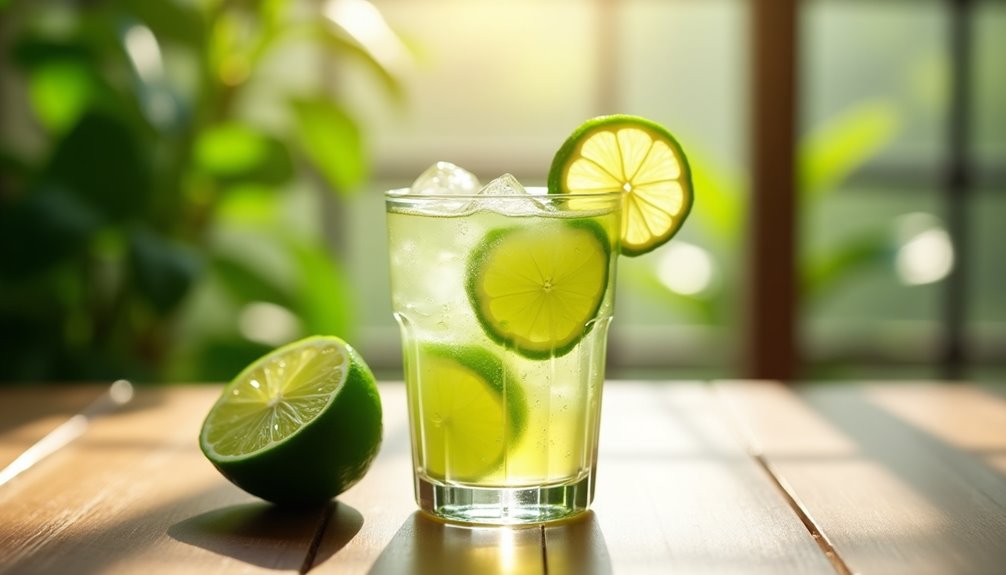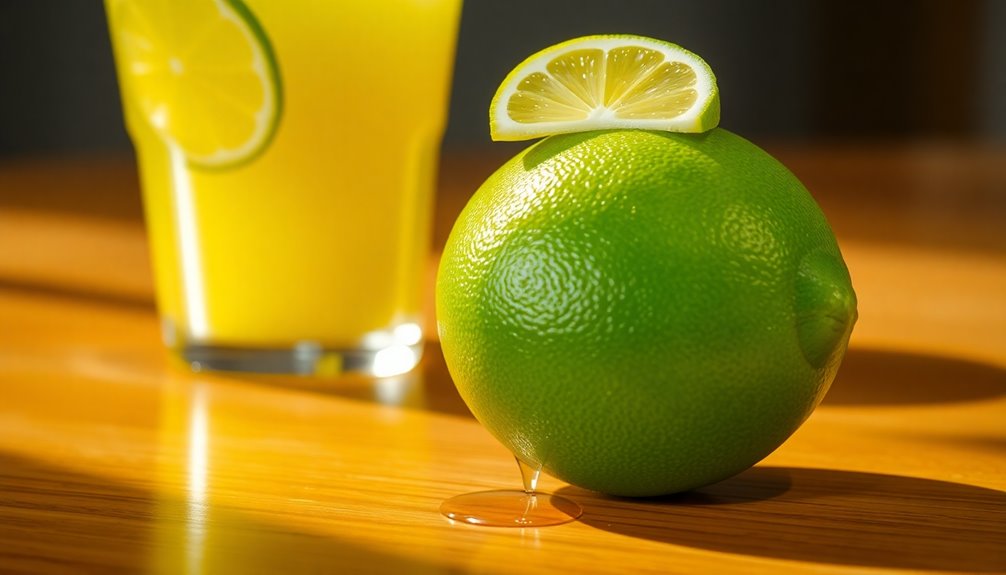Lime juice contains about 1.3 grams of carbohydrates per tablespoon, which means it's a low-carb option for your meals and drinks. With only 0.4 grams of net carbs, you won't have to worry about impacting your daily intake. It adds a refreshing zing to dishes, cocktails, and dressings without the guilt. Plus, lime juice offers health benefits like vitamin C. Stick around, and you'll discover even more ways to use this versatile ingredient.
Key Takeaways
- One tablespoon of lime juice contains approximately 1.3 grams of carbohydrates.
- The net carbs in one tablespoon of lime juice are about 0.4 grams.
- Whole limes have around 3.2 grams of carbohydrates and 0.74 grams of sugar.
- Lime juice is a low-carb option, suitable for keto and health-conscious diets.
- Its minimal carb content allows for versatile use in various culinary applications.

When you're looking to add a zesty flavor to your dishes or drinks, you might wonder how many carbs are in lime juice. It's a common question, especially if you're keeping an eye on your carbohydrate intake for health reasons or dietary plans. The good news is that lime juice is an excellent low-carb option, making it a fantastic choice for flavoring without adding significant calories or carbs to your meals.
Let’s break it down. A typical serving size of lime juice is about one tablespoon, which weighs approximately 15 grams. In that tablespoon of lime juice, you’ll find around 1. 3 grams of carbohydrates. This number is quite low, which is a relief for anyone watching their carb consumption. If you’re counting net carbs, the situation looks even better: there are only about 0. 4 grams of net carbs in that tablespoon, which means you’re really not adding much to your daily total when you use lime juice. This makes lime juice a fantastic option for flavoring dishes without significantly impacting your carbohydrate intake. Many people wonder how much lime juice daily is appropriate to reap its benefits without compromising their dietary goals. Incorporating a tablespoon or two into your meals can provide a refreshing zest while keeping your carb count in check.
Now, if you're using whole limes instead of just the juice, you might wonder how that changes the carbohydrate content. A standard lime weighs about 44 grams and contains approximately 3.2 grams of carbohydrates. Within that carbohydrate count, there's about 0.74 grams of sugar. While it's essential to keep track of sugars, the amount in a lime is still relatively minor, especially when you consider how much flavor you're getting in return. This makes lime juice a versatile ingredient, whether you're squeezing it over fish, adding it to cocktails, or mixing it into dressings.
What's great about lime juice is that it not only adds flavor but also has health benefits. It's rich in vitamin C, which can boost your immune system and enhance skin health. Plus, the tangy taste can elevate the profile of many dishes without weighing them down with carbs.
So, if you're trying to spice up your meals, lime juice can be your go-to ingredient, balancing taste and nutrition beautifully. For those following specific dietary plans, like keto or low-carb diets, lime juice fits seamlessly into these frameworks. You can use it liberally in marinades, salad dressings, or even in desserts without worrying about exceeding your carb limits.
You'll find that a little lime juice goes a long way in enhancing flavor, and with so few carbs, you can enjoy it guilt-free.
Frequently Asked Questions
Is Lime Juice Good for Keto?
Yes, lime juice is great for keto! It adds a burst of flavor to your meals without piling on carbs.
With just 0.4 grams of net carbs per tablespoon, it fits easily into your daily limits. You can use it in dressings, marinades, or even in water for a refreshing drink.
Plus, the vitamin C it offers supports your health while you enjoy a variety of tasty, keto-friendly dishes.
How Many Carbs Are in a Squeeze of Lime?
Did you know that a typical lime, weighing around 44 grams, contains only about 3.2 grams of carbohydrates?
When you squeeze a lime, you're likely getting around 1 gram of carbs per tablespoon of juice.
This means you can enjoy that zesty flavor without worrying much about your carb intake.
Is Lime High in Carbs?
No, lime isn't high in carbs. In fact, it's quite low in carbohydrate content, making it a great option for your low-carb diet.
You'll find that a whole lime contains only about 3.2 grams of carbs, primarily from sugars.
So, if you're looking to add flavor without worrying about carb intake, using lime juice can be a smart choice.
Enjoy its tangy taste while keeping your carb count in check!
How Many Carbs Are in Liquid I.V. Lemon Lime?
When you're looking at Liquid I.V. Lemon Lime, you'll find it contains 11 grams of carbohydrates per serving.
Most of these carbs come from added sugars, with 5 grams being sugar. This carbohydrate content is designed to help you stay hydrated and energized, especially when you're active.
Plus, it includes essential vitamins and minerals that work together to enhance fluid absorption, making it a great choice for hydration.
Conclusion
In the end, while lime juice may seem like a small splash of flavor, it carries just a hint of carbohydrates—about 1 gram per tablespoon. This tiny amount contrasts sharply with the zest it brings to your dishes and drinks. So, you don't have to worry about carbs weighing you down while enjoying its vibrant taste. Embrace the acidity and brightness of lime juice; it's a delightful addition that enhances your meals without breaking your carb budget.
Cindy thoroughly researches juicing trends, techniques, and recipes to provide readers with practical advice and inspiration. Her writing style is accessible, engaging, and designed to make complex concepts easy to understand. Cindy’s dedication to promoting the advantages of juicing shines through her work, empowering readers to make positive changes in their lives through the simple act of juicing.











